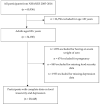Food Insecurity and Depression among US Adults: NHANES 2005-2016
- PMID: 35956257
- PMCID: PMC9370686
- DOI: 10.3390/nu14153081
Food Insecurity and Depression among US Adults: NHANES 2005-2016
Abstract
A growing body of evidence suggests that food insecurity is associated with adverse mental health outcomes such as depression and anxiety. In this study, the relationship between food insecurity and depression was examined using data from the 2005−2016 National Health and Nutrition Examination Survey (NHANES). Food insecurity was assessed with the 18-item United States Food Security Survey Module with zero affirmative responses indicating high food security, 1 or 2 affirmative responses indicating marginal food security, and ≥3 affirmative responses indicating food insecurity. Depression was assessed with the Patient Health Questionnaire-9 with scores ≥10 indicating depression. Data were analyzed from 28,448 adult participants aged 20 or older. Food insecurity was present in 19.2% of the sample population (n = 5452). Food security status was significantly associated with gender, race, education level, marital status, smoking status, and BMI (Rao-Scott chi-square, p < 0.05). Fully food secure and very low food security adults experienced depression at a rate of 5.1% and 25.8%, respectively (Rao-Scott chi-square, p < 0.0001). Participants with very low food security had a significantly greater odds of depression than food secure adults, OR = 3.50 (95% CI: 2.98, 4.12). These findings suggest that food insecurity is a significant risk factors for depression in US adults over 20 years of age. To address this issue in our citizenry, police initiatives and public health interventions addressing both food access and mental health should be prioritized.
Keywords: NHANES; United States; depression; food insecurity.
Conflict of interest statement
The authors declare no conflict of interest.
Figures
Similar articles
-
Measuring Food Insecurity in Older Adults Using Both Physical and Economic Food Access, NHANES 2013-18.J Nutr. 2022 Aug 9;152(8):1953-1962. doi: 10.1093/jn/nxac058. J Nutr. 2022. PMID: 35285903
-
Food insecurity is associated with metabolic syndrome among US adults: NHANES 2005-2016.Nutr Res. 2024 Jun;126:159-166. doi: 10.1016/j.nutres.2024.03.014. Epub 2024 Apr 1. Nutr Res. 2024. PMID: 38718433 Free PMC article.
-
Household food insecurity is positively associated with depression among low-income supplemental nutrition assistance program participants and income-eligible nonparticipants.J Nutr. 2015 Mar;145(3):622-7. doi: 10.3945/jn.114.199414. Epub 2014 Dec 31. J Nutr. 2015. PMID: 25733480
-
Food insecurity, food assistance and weight status in US youth: new evidence from NHANES 2007-08.Pediatr Obes. 2014 Apr;9(2):155-66. doi: 10.1111/j.2047-6310.2012.00143.x. Epub 2013 Jan 31. Pediatr Obes. 2014. PMID: 23364918 Review.
-
Food insecurity and mental health outcomes among homeless adults: a scoping review.Public Health Nutr. 2021 May;24(7):1766-1777. doi: 10.1017/S1368980020001998. Epub 2020 Jul 22. Public Health Nutr. 2021. PMID: 32693863 Free PMC article.
Cited by
-
Exploring Drivers of Binge Eating in Individuals With Food Insecurity and Recurrent Binge Eating: A Qualitative Analysis.Int J Eat Disord. 2025 Jul;58(7):1244-1255. doi: 10.1002/eat.24434. Epub 2025 Apr 2. Int J Eat Disord. 2025. PMID: 40171837 Free PMC article.
-
Exploring Food Insecurity and Perceived Stress on Daytime Sleepiness among Older Adults in New York City.Foods. 2024 Sep 6;13(17):2831. doi: 10.3390/foods13172831. Foods. 2024. PMID: 39272596 Free PMC article.
-
Association between atherogenic coefficient and depression in US adults: a cross-sectional study with data from National Health and Nutrition Examination Survey 2005-2018.BMJ Open. 2023 Oct 29;13(10):e074001. doi: 10.1136/bmjopen-2023-074001. BMJ Open. 2023. PMID: 37899167 Free PMC article.
-
Household Food Security Status and Allostatic Load among United States Adults: National Health and Nutrition Examination Survey 2015-2020.J Nutr. 2024 Feb;154(2):785-793. doi: 10.1016/j.tjnut.2023.12.041. Epub 2023 Dec 28. J Nutr. 2024. PMID: 38158187 Free PMC article.
-
Association between energy-adjusted dietary inflammatory index and total immunoglobulin E: A cross-sectional study.Food Sci Nutr. 2023 Dec 9;12(3):1627-1634. doi: 10.1002/fsn3.3854. eCollection 2024 Mar. Food Sci Nutr. 2023. PMID: 38455225 Free PMC article.
References
-
- Coleman-Jensen A., Rabbitt M.P., Gregory C.A., Singh A. Household Food Security in the United States in 2020, ERR-298. [(accessed on 1 October 2021)];2021 Available online: www.ers.usda.gov.
-
- The U.S. Conference of Mayors . Report on Hunger and Homelessness. National Alliance to End Homelessness; Washington, DC, USA: 2016.
MeSH terms
LinkOut - more resources
Full Text Sources
Medical


